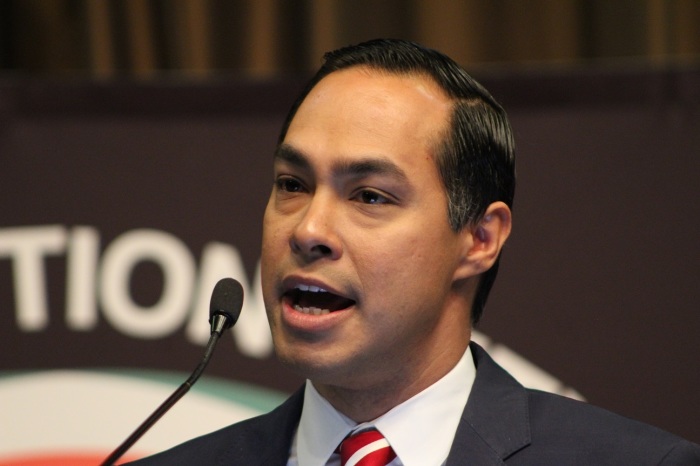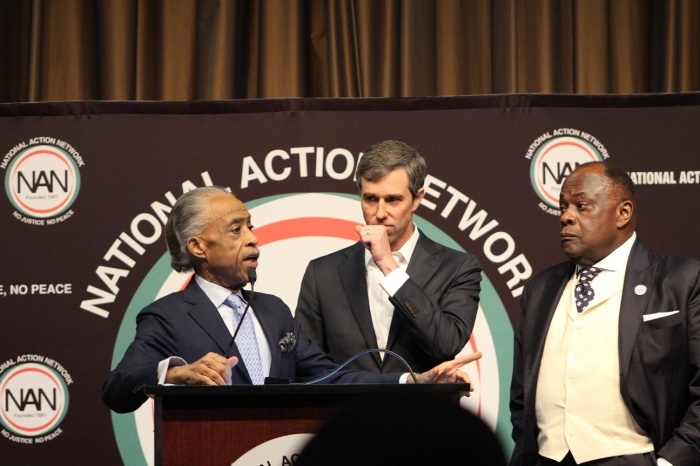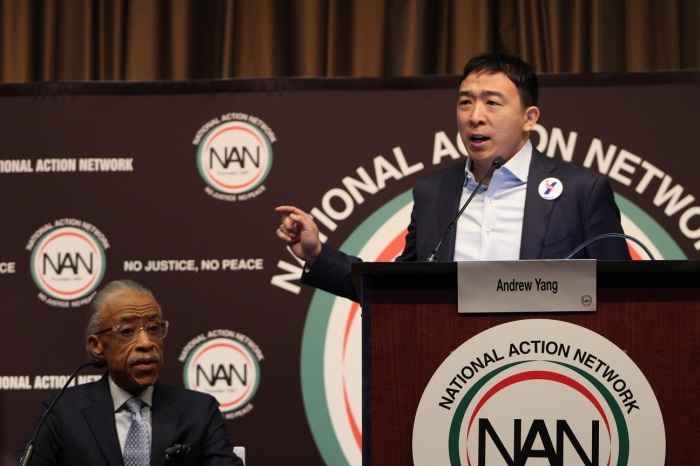At Al Sharpton’s NAN convention, 2020 Democrat candidates support reparations for African Americans

NEW YORK — Democrat presidential candidates Andrew Yang, Beto O’Rourke and Julián Castro voiced strong support for reparations for the descendants of slaves to a packed gathering of civil rights activists and African-American voters on Wednesday.
“I have said several times during the last several weeks that I have long believed that our country will never truly heal until we address the original sin of slavery,” Castro, the former secretary of U.S. Housing and Development under former President Barack Obama told the affirming crowd at the Rev. Al Sharpton’s annual National Action Network convention in Manhattan.
“If under our Constitution we compensate people if we take their property, why wouldn’t we compensate people who were considered property and sanctioned by the state? I support Congresswoman Jackson-Lee’s HR 40 to appoint a commission to make a recommendation to the president of the United States on how we can do reparations in the country and I believe that for the black community, for the white community, for every other American, that it’s important to address that original sin. And until we do, we may feel like we’re moving forward as one nation but I don’t think we ever will,” Castro said.
Texas Rep. Sheila Jackson Lee introduced the H.R. 40 bill in January called the Commission to Study and Develop Reparations Proposals for African Americans Act.

“This legislation is intended to examine the institution of slavery in the colonies and the United States from 1619 to the present, and further recommend appropriate remedies. Since the initial introduction of this legislation, its proponents have made substantial progress in elevating the discussion of reparations and reparatory justice at the national level and joining the mainstream international debate on the issues,” Lee noted in a statement. “Though some have tried to deflect the importance of these conversations by focusing on individual monetary compensation, the real issue is whether and how this nation can come to grips with the legacy of slavery that still infects current society. Through legislation, resolutions, news, and litigation, we are moving closer to making more strides in the movement toward reparations.”
O'Rourke, a former Texas representative who currently enjoys somewhat of a rock star status among some Democrats, said during an interview with Sharpton at the convention that he would sign Lee’s bill into law as president.
“I think she is absolutely right. That is something I would sign into law as president of the United States. Talking to someone like Bryan Stevenson who’s done so much work in ensuring that we don’t just celebrate civil rights victories and leave that as the story of race in this country. But we also look at the brutality, the violence, the continuing suppression today,” O’Rourke told Sharpton.


“Texas [was] 50th in the nation in 2018 in [voter] turnout, not because we like our democracy any less but people were written out of their democracy and therefore [unable] to represent the true genius of a state and by extension our country. Accepting that truth, that story, those facts is the beginning of a process of repair and that is as the root of any reparation discussion that will follow. So I support my former colleague Sheila Jackson Lee in this effort and want to make sure that at a minimum, we have that conversation and share those facts with the rest of the country,” he said.
He later reiterated his support for the proposal before the large audience, explaining how he learned a lot on the issue of reparations from founder and executive director of the Equal Justice Initiative Bryan Stevenson.
“I had a chance to speak with, learn from and listen to Bryan Stevenson in Montgomery, Alabama, and learn from his work on working with the community to build a memorial to justice and to peace. And he said foundational to reparations is the word repair, foundational to repair is the truth. And so all Americans understand that civil rights are not just those victories that I began with at the outset, but the injustices that have been visited and continue to be visited on people we will never get the change to live up to the promise of this country. So absolutely I would sign that into law,” he said to applause.
Yang who pitched his $1,000 a month Universal Basic Income platform called reparations a “logical step.”
“I would go again further, I would put $1,000 a month in the hands of every adult starting at age 18 and then I would say this is not reparations. We need to study reparations independently of the fact that we can make this economy work for you all, minimum, minimum,” he said.





























